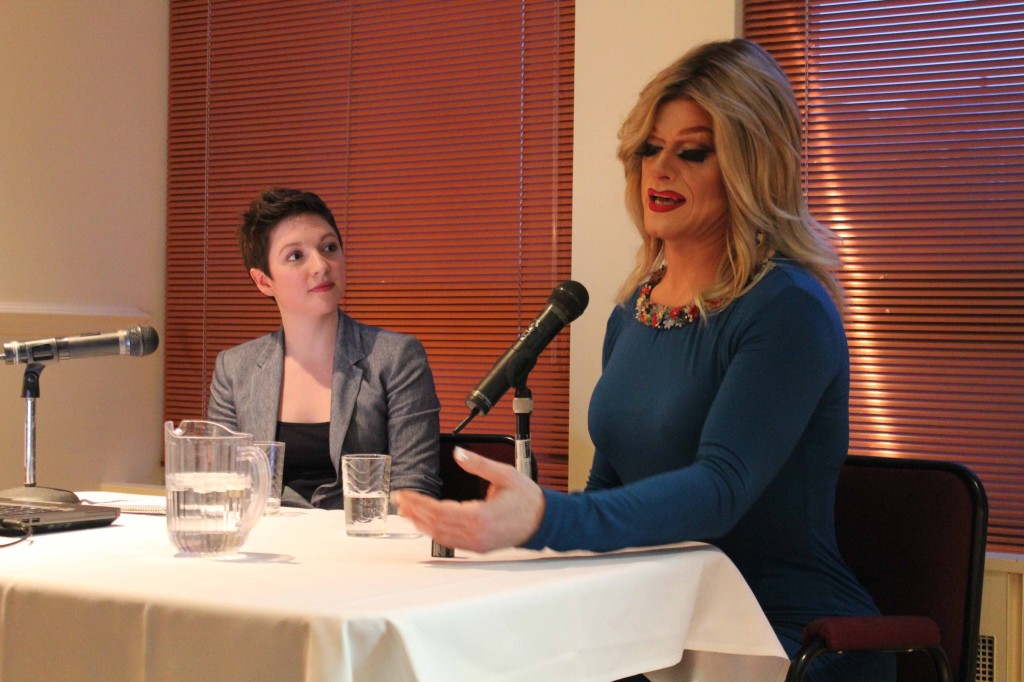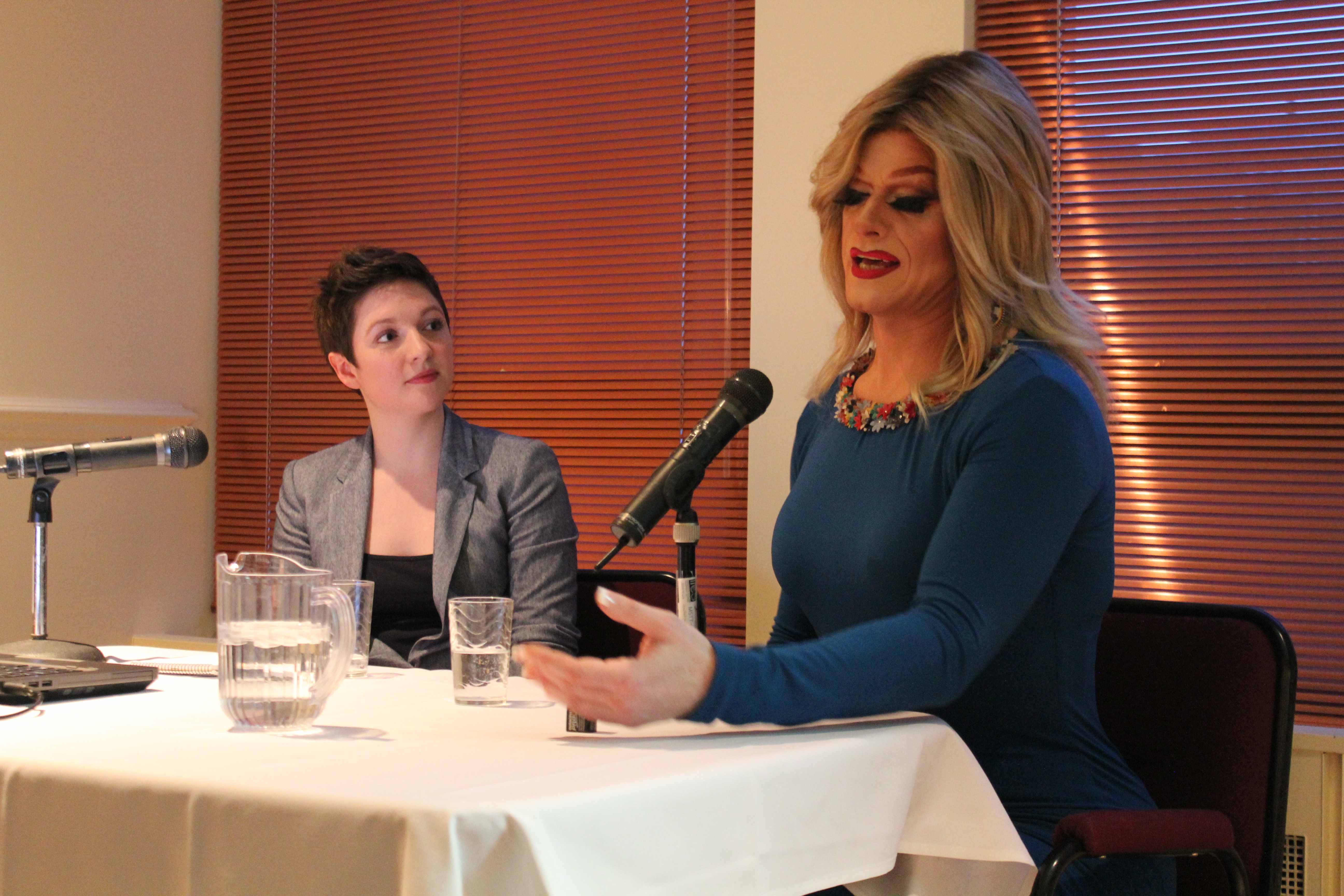Miss Panti Bliss would describe herself as being “a national fucking treasure.”
After attending the Q & A with Ireland’s most loved Drag Queen and accidental gay rights activist at Concordia on March 25, one could not help but agree.
The talk was organized collaboratively by Concordia’s Canadian Irish Studies and Saint Mary’s University in Halifax, and ended with attendees—about 100 people—giving Miss Panti Bliss a standing ovation.
Emer O’Toole, an assistant professor of Irish performance studies, started the Q&A by reminding the audience that Miss Panti Bliss has been involved with gay right activism for a very long time.
Back in 1987, Miss Panti Bliss began hosting the Alternative Miss Ireland Pageant, which aimed to raise awareness for the

rape crisis, and later to raise money for HIV and AIDS. The pageant was open to everyone, including animals, and later became a part of the Dublin Saint Patrick’s day parade. Many drag queens took part in the pageant, and it became an alternate pride celebration.
“I always described the work that I do, jokingly, as glamour routed in despair… I am trying to say something important by using something that seems silly, like me,” Miss Panti Bliss said.
On Jan. 11, Rory O’Neill, which is Miss Panti Bliss’s given name, appeared on RTÉ’s The Saturday Night Show with Brendan O’Connor to discuss homophobia. While on the show, O’Neill said that some people involved in Irish journalism were homophobic.
After showing the room the video, a round of applause ensued.
“I haven’t seen that in months and it seems so innocuous,” she said. “I think that I was really reserved about what I said. I could’ve been a lot harder on those dicks!”
Miss Panti Bliss explained that, at first, this seemed like a situation that would make Ireland look bad.
“It looked like it was saying ‘Ireland is such a backward little shithole of a country that somebody can’t even point out that a homophobe is a homophobe anymore in that country or they’ll be sued and dragged through the courts,’” Miss Panti Bliss said.
“However, what happened in the end was that the good, decent, ordinary Irish people were as horrified as everybody that those people would sue someone for saying that, especially when they clearly are a bunch of homophobes.”
These people, according to Miss Panti Bliss, are the reason that the movement, known as both “Team Panti” and “Pantigate,” became such a phenomenon.
In the first few weeks after the show on RTÉ, a lot of people attacked Miss Panti Bliss. These were the people who had felt insulted by what she had said. After those weeks passed, though, the Irish people took her side.
“I spent maybe three weeks being attacked…but then I spent maybe the last three months being, you know, a national fucking treasure!”
On Feb. 1, Panti Miss Panti Bliss responded to the events that surrounded the RTÉ controversy by speaking at the Abbey Theatre. The video of her speech went viral, with people from all over the world responding.
“It was outstanding to me that Irish people cared. But it absolutely blew me away that people in bloody Montreal, Canada give a shit about this.”
According to Miss Panti Bliss, less than half of her fans were LGBT people. Many were people who apologized for how they had treated LGBT people, others had gay siblings, many were in wheelchairs or had Aspergers syndrome, and felt that they were treated in a similar way as the gay population.
It was astounding to her the amount of people who cared about the speech she did on such a specific issue.
In the speech at the Abbey Theatre, Miss Panti Bliss spoke of some issues gay people deal with on a daily basis, a few of which she considers her dirty little secrets. One of these was feeling embarrassed when friends publicly “acted gay.”
“Here am I, a 45-year-old drag queen, who’s made a living doing this for the last thirty years, I own a fucking gay bar, and I’m still embarrassed sometimes by how gay my friend is in public. I thought that that was my dark little secret and it turns out that every single gay in the world sometimes feels that. That blew me away,” Miss Panti Bliss said.
O’Toole then showed O’Connor’s apology, done on behalf of RTÉ, which aired two weeks after the show had aired. The original interview had been taken off of RTÉ’s online archive. Although Miss Panti Bliss hated the apology, ‘Pantigate’ would never have become what it is without it. RTÉ paid the people who had threatened to sue. Since RTÉ is publicly funded, it paid them with taxpayer’s money, which angered people, and gained Miss Panti Bliss more supporters. Miss Panti Bliss believes that, had RTÉ not payed off the people named in the interview, she would have been dragged through the courts. Because taxpayer money was involved, Miss Panti Bliss’s supporters increased, and suing her at that point would have angered the population even further.
Miss Panti Bliss later spoke of gay marriage in Ireland, and of her definition of homophobia and explained that, in a way, homophobes have an irrational fear of gay people.
“I don’t think that those newspaper columnists walk by the hairdresser’s and shudder, but what they do have a fear of is what the world will look like, and what their place in the world will be, if gay and lesbian people are given full equality… It is a fear of change. That is an irrational fear, and when you boil down it’s the same as being afraid of gay people,” Miss Panti Bliss said.
Miss Panti Bliss explained that the reason people attacked her after she called them homophobes was that they knew that, when the gay marriage referendum came around in 2015, calling someone a homophobe would make all their arguments null.
“They had to shut down any possibility that they could publicly be called homophobes and I just happened to be the one who, at that particular time, called them a bunch of homophobes,” Miss Panti Bliss said.
Miss Panti Bliss then spoke of her work with the New York City Saint Patrick’s day parade. Gay people are not allowed to participate in the parade, and every year, many public spats take place about this.
“I think that homophobes are particularly annoyed when a bloke in a dress calls them out on something. It always reminds me of the power of drag. There is something incredibly powerful about not gender conforming. It freaks out homophobes.”
“They don’t go after the gay guy in a suit and glasses, they don’t go after the lesbian in the three inch court heels and nice skirt, they go after the lesbian with the butch haircut and the leather jacket and they go after the gay guy in a dress.”
About 15 years ago, an alternative parade called the St. Pat’s for All Parade was created in Queens, NY. The parade got a lot of attention this year, as the mayor of the city and the entire city council refused to walk in the mainstream parade. Twenty members of city council walked in the alternative parade alongside Miss Panti Bliss.
At the end of the Q&A, the floor was opened to the audience who shared their personal stories with Miss Panti Bliss, and asked more questions about ‘Pantigate’.
The event ended with a standing ovation, with people lining up afterwards to go meet and personally thank Miss Panti Bliss.
All eyes will be on Miss Panti Bliss, and on Ireland, as the country heads into its gay marriage referendum next year. Miss Panti Bliss hopes that ‘Pantigate’ will impact the referendum’s results.
“While I don’t want to overemphasize what’s happened recently or just sort of have an overly optimistic view of how things might change it is possible that this stupid ‘Pantigate’ incident could actually change everything for gay people. I’m not saying it is going to happen, but it’s possibl.,”
“Ireland is [so small] that a single incident could have a massive effect… I could hope that that is the case, not just for gay and lesbian people, but particularly for trans people. At the moment it seems like an important moment for them. And I would hope that maybe this could be a time for them that could dramatically change everything in Ireland.”




